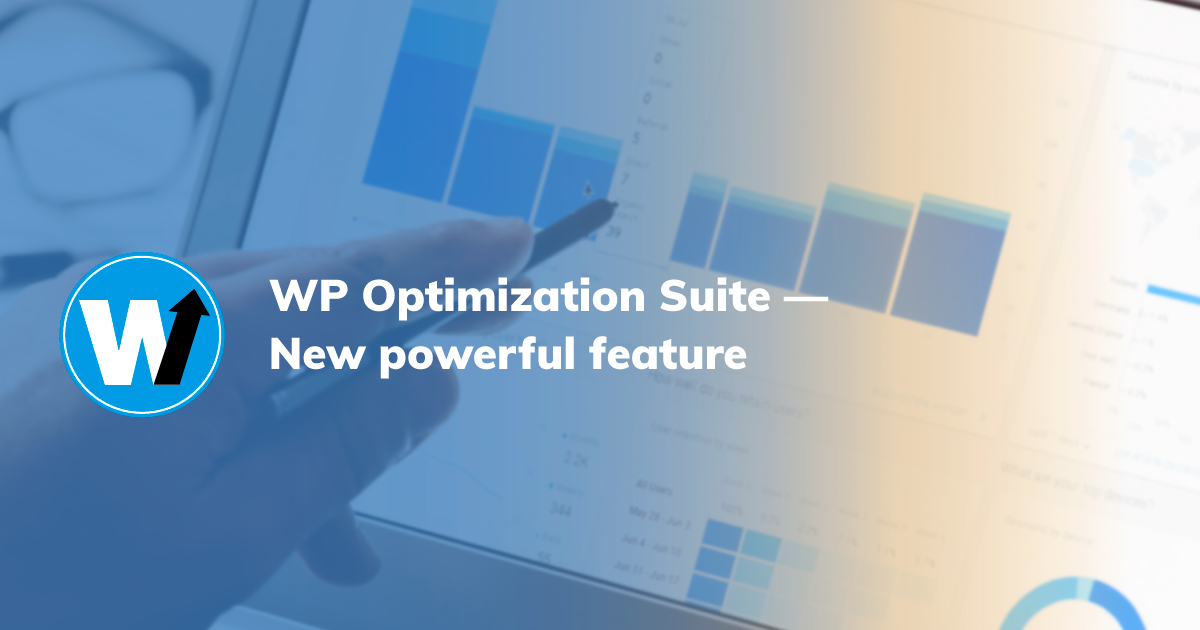WP Optimization Suite - A New Powerful Feature for Websites Performance

Updates from Sept 20, 2021: WP Optimization Suite packages were released to the stable repository!
Performance is one of the most important benefits a web host can offer, that’s why Cloudlinux continues to expand the features portfolio with a new powerful tool that will help website and server owners to speed up their business even more. We are happy to announce the WP Optimization Suite beta release (already available in a stable version).
The WP Optimization Suite is included with CloudLinux OS Solo and soon will be available with the Shared PRO version as well. Together with PHP X-Ray, site owners and administrators running WordPress on VPS can ensure their sites run at peak performance. These performance tools also help administrators keep their servers fine-tuned to stop customer churn and build a high-value reputation as a hosting provider.
We decided to launch the Beta version of the Tool with the Object Cache Module for the beginning so our users can already start testing it and speed up the content management system (already available in a stable version). For every WordPress page that loads, the system queries the database for content, configurations, themes, plugin data, and anything else needed to render the page. Caching stores data in memory to speed up page responses, so when a page is requested no (or fewer) database queries are necessary to render page content. Even if you use caching in Nginx, you still must exclude users logged in and partial pages. The WP Optimization Suite will let you optimize partial pages and pages from authenticated users.
WP Optimization Suite uses object caching that stores database query results and eliminates subsequent requests, which speeds up the load time. The tool offers:
- Automatically configure object storage
- Health check after turning the module ON
- Memory limit customization
(Already available in a stable version!)
In the beta release of the WP Optimization Suite, users have access only to the Object Cache module and in an upcoming release, the tool will be expanded with a list of new functions. Currently, the Object Cache module has a web interface to let users configure Object Cache for any website, and work with WordPress using installed plugins. It allows to speed up load times, database queries and you can expect the next performance improvements from it:
- Speed up sites such as eCommerce, membership sites, discussion forums, and blogs with a highly active comment section. Any dynamic site will benefit from the Object Cache Module.
- Object caching speeds up repeatable queries by storing them in RAM so that the server does not need to generate new results for every request.
- The biggest benefits from caching will see the large sites that often support numerous queries and requests.
- Small sites on shared hosting with caching enabled put less load on the server and therefore use fewer resources.
- In case the site has important pages that cannot be cached entirely and excluded from "the whole page caching" due to any reason, the partial pages cache will work so that components that can be cached load faster and reduce overall page load times.
In the next releases WP Optimization Suite it is planned to continue feature upgrades with the Site Optimization module that will include:
- Page Caching
- Preload capabilities
- CSS and JavaScript minification
- Lazy loading
- Database optimizations
The new feature release tool is currently included in CloudLinux OS Solo so if you already use one, you get WP Optimization Suite by upgrading your OS to the latest version. If you don’t have Solo installed - you can set it up for free and test all features during a month. If you use a regular CloudLinux Shared version but want to test new CloudLinux features, you can try the Shared PRO version for free for 30 days or buy it on our website. WP Optimization Suite will be included in the Shared PRO version in about a month.
The WP Optimization Suite feature is already included in the product price, so you experience no additional charges. You can find prices for all CloudLinux OS product versions here https://www.cloudlinux.com/pricing/

When your servers don’t give customers the speed that they need, it’s inevitable that you will lose them and possibly suffer from reputation damage. The main issue for web hosts is ensuring speed while still giving site owners complete autonomy over their own creations. In many cases, hosts must tackle WordPress performance issues while still allowing customers to customize their sites as needed.
The WordPress core application is well developed and fast, but site owners often have dozens of additional plugins installed to customize their interface. These plugins could be poorly coded for performance and could use extensive resources on the server. This challenge causes frustrations for web hosts with limited development resources to fine-tune servers.
VPS site owners have the same problem. While they don’t host sites on a shared server, they still want to fine-tune their sites for the fastest performance. For a site owner unfamiliar with the ways a server operates, fine-tuning could be beyond their scope of expertise. Running WordPress on a VPS also requires knowledge of the underlying operating system and server performance tuning.
To help combat performance issues from plugins, poorly optimized functions, and themes, CloudLinux OS Solo offers a suite of tools specifically designed to optimize WordPress. Together with PHP X-Ray, which detects performance bottlenecks across site configurations, site owners running WordPress on VPS can ensure their sites run at peak performance without issues and any degradation is reported to the administrator before it affects the bounce rate. Now, administrators can then take action on a particular plugin, function, or query to improve performance.
With CloudLinux OS Solo, website owners are empowered to take action quickly before poor performance affects revenue and reduce the risk of losing potential customers and search engine traffic.
To learn more about technical details and installation process - follow our documentation or contact us directly at sales@cloudlinux.com











